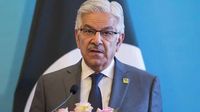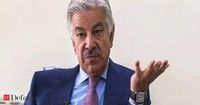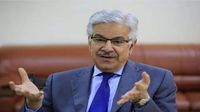In a dramatic escalation of tensions between India and Pakistan, Defence Minister Khawaja Asif of Pakistan stated on May 7, 2025, that his country is prepared to de-escalate hostilities, provided India also backs down from its military operations. This statement comes in the wake of India's Operation Sindoor, which targeted nine sites in Pakistan and Pakistan-occupied Kashmir (PoK) that were deemed to be linked to terrorist activities. The operation was initiated as a response to a deadly attack on Indian tourists in Pahalgam that resulted in the deaths of 26 people, predominantly civilians.
Asif, speaking to Bloomberg Television, emphasized, "We have consistently maintained over the past two weeks that we will not initiate any hostile action against India. However, if we are attacked, we will respond. If India chooses to step back, we are fully prepared to wind down this tension." His comments mark a significant shift from earlier statements where he had warned of a strong retaliation if provoked.
In the early hours of May 7, the Indian armed forces conducted missile strikes on what they described as terrorist infrastructure, claiming that over 80 terrorists were killed in the strikes. The Indian government clarified that the operation was a calibrated response to the Pahalgam attack and that no Pakistani military facilities were targeted. Prime Minister Narendra Modi had granted the armed forces complete operational freedom to determine the timing and targets of the response, indicating a clear mandate for decisive action.
Following the strikes, Asif reiterated that Pakistan would not initiate hostilities but would respond if attacked. He stated, "We have been saying all along in the last fortnight that we'll never initiate anything hostile towards India. But if we're attacked, we'll respond. If India backs down, we will definitely wrap up this tension." This statement was perceived as an opening for potential dialogue, but analysts remain cautious, noting the high levels of mistrust between the two nuclear-armed nations.
The recent military actions have led to a dangerous uptick in military activity along the Line of Control (LoC), with both countries placing their forces on high alert. Reports indicate that cross-border shelling has intensified, forcing thousands of civilians on both sides to evacuate their homes. Both governments have been urged by international observers, including the United Nations and several world powers, to exercise restraint and seek diplomatic solutions to avoid a full-scale conflict.
In light of these developments, the United States has also stepped in, with US Chargé d’Affaires Natalie Baker meeting with Pakistani Deputy Prime Minister and Foreign Minister Ishaq Dar to discuss de-escalation efforts. The US has expressed its desire to engage with both countries to prevent further escalation and has encouraged diplomatic dialogue.
Asif's comments reflect an acknowledgment of the precarious situation, as he noted, "Pakistan does not seek war. Our forces are prepared, but we are equally prepared to exercise restraint — conditional on India ceasing its current military campaign. If India stops, so will we." This conditional offer for restraint is viewed as a potential diplomatic opening, although the stakes are high given the longstanding territorial disputes and history of conflict between the two nations.
The backdrop of this latest confrontation includes several past incidents that have strained relations between India and Pakistan, including the 1999 Kargil conflict, the 2016 Uri attack, and the 2019 Balakot air strikes. Each of these events has contributed to a cycle of military escalation and retaliation, making the current situation particularly volatile.
As tensions continue to rise, the international community is closely monitoring the situation, with calls for both sides to prioritize dialogue over military action. Ayesha Malik, a regional security expert based in Lahore, commented on the need for caution, stating, "Given the history and the stakes involved, especially with both being nuclear-armed nations, any step toward de-escalation must be approached with caution and clarity."
In the meantime, the Pakistani government has approached the United Nations Security Council, asserting its right to respond to India's actions. As the situation develops, all eyes will be on the addresses from both the Indian and Pakistani leaders, as the world watches to see if a diplomatic resolution can be achieved amidst the rising tensions.






